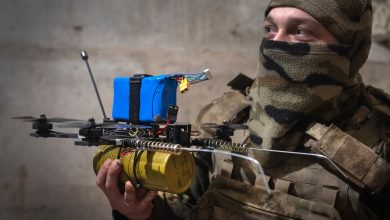Turkish navy starts construction of three new warships

ISTANBUL — The Turkish navy has begun the new year by announcing the construction of three warships based on domestic designs: a submarine, an aircraft carrier and the lead ship of the highly anticipated TF-2000 air-defense destroyer series.
The shipbuilding programs are closely linked to the political and naval ambitions of Turkey, honing the country’s long-range force projection and strike capabilities, in particular.
The new work brings the total number Turkish naval ships under construction to 31, according to service officials. The additions are meant to bolster the country’s local shipbuilding chops, a key element in the government’s preference for building weapons at home, versus importing them.
The first weld for the National Submarine (MİLDEN) was completed at Gölcük Naval Shipyard. Due to the general secrecy surrounding submarine operations, the Turkish Navy has shared only limited details about the project.
The MİLDEN is a diesel-electric submarine with a displacement of approximately 2,700 tons and a length exceeding 80 meters. It features an Air-Independent Propulsion (AIP) system, enabling extended submerged endurance compared to existing submarines. The submarine is equipped with domestically developed weapons, systems and sensors designed to increase payload capacity and diving depth.
Initial steel-cutting ceremonies for the surface vessels were held at Istanbul Naval Shipyard in Istanbul.
When fielded, the TF-2000 ships are meant to detect and intercept guided and ballistic missile threats while offering traditional naval combat capabilities.
Work on the project began in 2017, and the design has evolved through several iterations. The current configuration features a ship measuring 149 meters in length, 21.3 meters in width, and a draft of 5.75 meters, with a displacement of 8,300 tons.
The TF-2000 is powered by a CODOG propulsion system, allowing it to achieve speeds of 26 knots or more. It is armed with a 127mm main gun, two 25mm remote-controlled weapon stations, and a 35mm Gökdeniz close-in weapon system. The ship’s air defense capabilities consist of a combined 96-cell vertical launch system developed under Turkey’s own MİDLAS program.
Loaded into the VLS cells are Siper and Hisar air defense missiles, with the addition of Gezgin cruise missiles. The main sensor suite includes the ÇAFRAD phased array radar system, which provides a detection range of 450 km.
According to information from the Turkish Navy, the National Aircraft Carrier (MUGEN) will measure 285 meters in length, 75 meters in width, and have a draft of 10 meters, with a projected displacement of 60,000 tons — more than twice that of Turkey’s largest current warship, the TCG Anadolu. The MUGEN’s dimensions closely resemble those of the Queen Elizabeth-class carriers.
The aircraft carrier will feature a short take-off and barrier arrested recovery (STOBAR) configuration with a single runway and a ski jump angled at approximately 12–14 degrees.
The design includes a single island on the starboard side, with one aircraft elevator positioned forward of the island and another aft. Preliminary plans indicate three take-off spots: one for the TB-3 UCAV combat drone near the bridge level, another diagonally across the port side for the Hürjet manned aircraft, and the third at the port quarter for the Kızılelma unmanned jet. The ship will have three arresting wires and an angled deck for landings.
Cem Devrim Yaylali is a Turkey correspondent for Defense News. He is a keen photographer of military ships and has a passion for writing about naval and defense issues. He was born in Paris, France, and resides in Istanbul, Turkey. He is married with one son.







